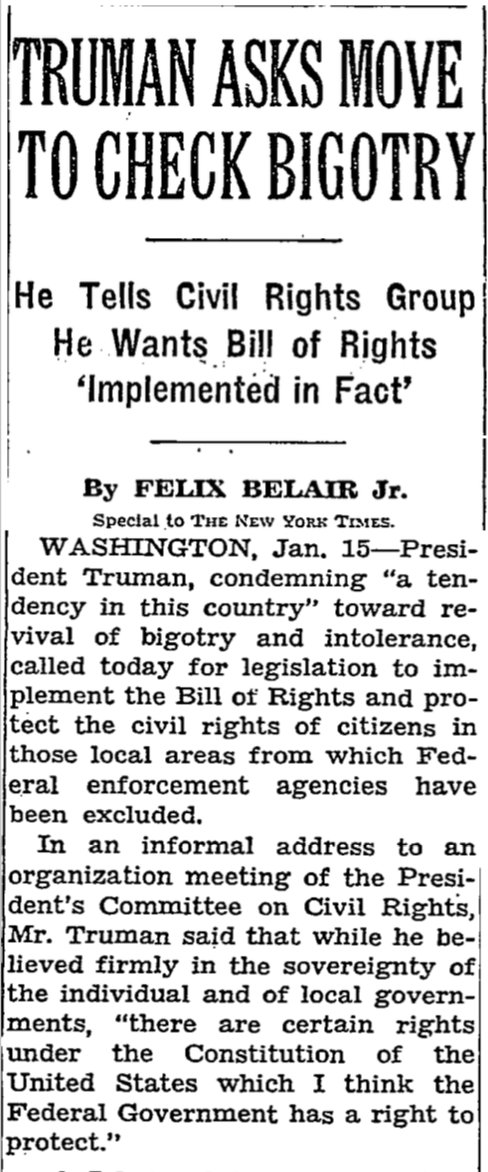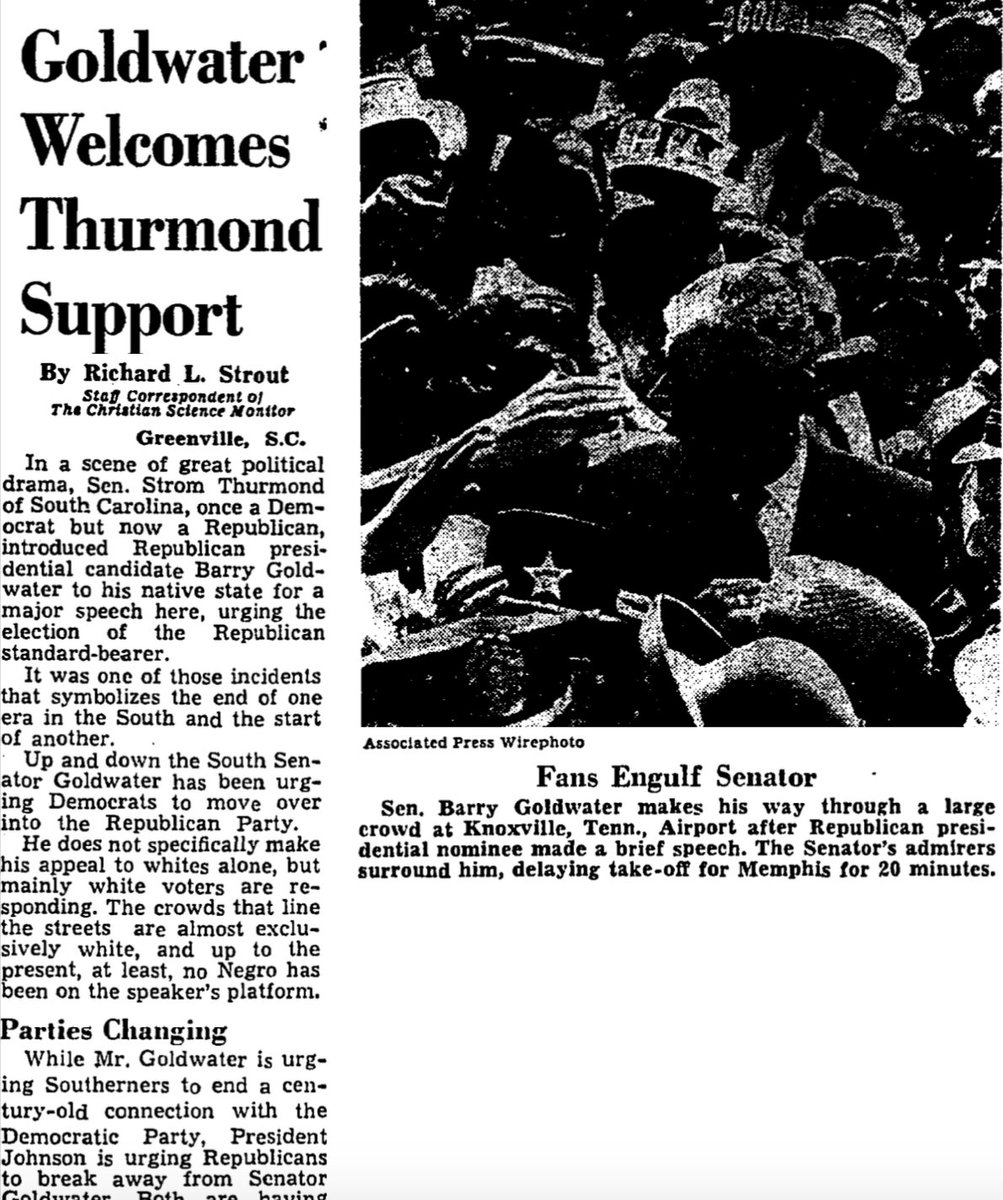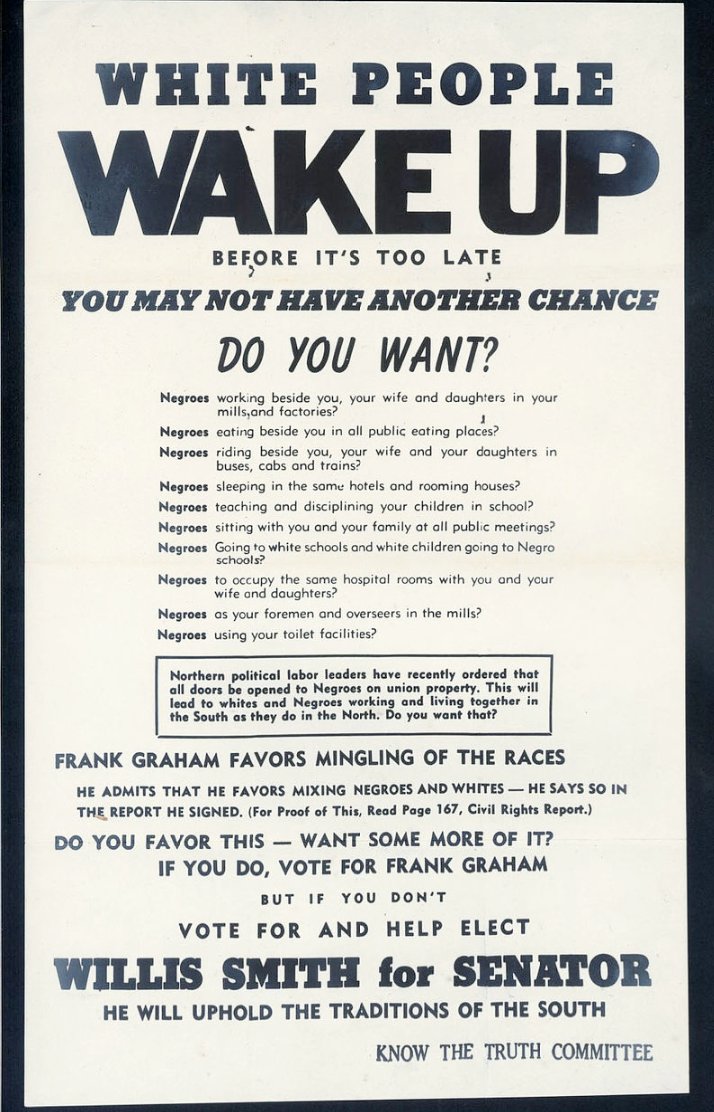Thread by @KevinMKruse: "Since @kanyewest's tweets have apparently made this topic unavoidable, some thoughts on the history of the parties' switch on civil rights.F […]"
40 tweets 12 hours ago
First, it's important to note that, yes, the Democrats were indeed the party of slavery and, in the early 20th century, the party of segregation, too.
(There are some pundits who claim this is some secret they've uncovered, but it's long been front & center in any US history.)
President Woodrow Wilson, for instance, instituted segregation in Washington and across the federal government. (See @EricSYellin's work.)
That said, both parties in this period had their share of racists in their ranks.
When the second KKK rose to power in the 1920s, it had a strong Democratic ties in some states; strong GOP ones elsewhere.
See this thread:
See @pashulman & @CleverTitleTK for a breakdown: washingtonpost.com/news/made-by-h…
This, then, was a period when the two parties' IDs were in flux.
Democrats still had a base of segregationists in the South, but increasingly some liberals in the North.
Republicans, liberal & even radical in Lincoln's era, had more conservatives joining, often in the West.
Importantly, despite some small gestures, FDR's brand of liberalism was purely focused on economic issues.
Though some in the administration (Eleanor Roosevelt, progressive Republican Harold Ickes, etc.) were racially liberal, the Democrats as a whole were not.
As Nancy Weiss Malkiel and others showed, African Americans began voting Democratic not because of the New Deal's record on race, but in spite of it.
Blacks stayed loyal to "the party of Lincoln" in 1932, but shifted in massive numbers to FDR in 1936. (~76% of northern blacks)
Over the next two decades, Democrats had an uneasy coalition that combined white southern conservatives and African Americans in the north, plus a growing number of white liberals.
This tension came to a head in the 1948 election, under the leadership of President Harry Truman.
Then -- to the nation's shock -- he pressed hard for all its recommendations, including protecting black voting rights and desegregating the military.

Liberal Democrats rallied around Truman's call, with then-Minneapolis Mayor Hubert Humphrey urging the 1948 DNC "to get out of the shadow of states' rights and walk forthrightly into the bright sunshine of human rights."
It was a turning point for the party, the first major fight on civil rights in which northern liberals beat back southern conservatives and took control of the party on race relations.

Famously, of course, Southern Democrats bolted the party in anger, forming the States Rights Democratic Party -- "the Dixiecrats" -- under the leadership of avowed segregationist Strom Thurmond, seen here railing against Truman's civil rights proposals:
Thurmond and the Dixiecrats took four Deep South states (notably, all places where local allies kicked Truman off the ballot) but Truman still won re-election that fall.
The Dixiecrats came back into the coalition, but increasingly saw that they were on the losing end of things.
The Democratic Party was still the only party in the South, where the Republicans -- "the party of Lincoln" -- were still reviled and, as a result, virtually non-existent.
In his classic 1949 study, the famous political scientist V.O. Key judged that the Republican Party in the South "scarcely deserves the name of party. It wavers somewhat between an esoteric cult on the order of a lodge and a conspiracy for plunder."
In fact, Republicans were so rare in the South that in the 1950s they told a story in East Texas about a sheriff who threw out the only two votes for a Republican candidate on the assumption that the candidate himself must have voted twice.
Both parties vied for the southern white vote during the 1950s, and thus took a fairly hands-off approach to civil rights.
Republican President Dwight Eisenhower and Illinois Gov. Adlai Stevenson, his Dem opponent in 1952 & 1956, both tried to duck the issue whenever possible.
As president, Ike sympathized with southern whites.
After Brown v. Board, he said appointing Chief Justice Earl Warren had been "the biggest damfool mistake I ever made." He refused to urge compliance with Brown, allowing southern Democrats to wage "massive resistance" to it.
Eisenhower reluctantly intervened in Little Rock, but only belatedly, when Democratic Governor Orval Faubus's defiance of the Supreme Court -- and, by extension, Eisenhower's own authority -- got dangerously out of hand.
JFK was a lot like Ike on civil rights. He made symbolic efforts in the 1960 campaign, calling Coretta Scott King when MLK was in jail and winning key black votes in the North.
But until the Birmingham protests in 1963 he was generally reluctant to act, just as Ike had been.
In June 1963, after the Kennedy administration secured the desegregation of the University of Alabama -- over the objections of Democratic Gov. George Wallace -- JFK issued this stirring call for the legislation that would become the Civil Rights Act.
When JFK was assassinated, Lyndon B. Johnson didn't simply continue to push for the Civil Rights Act, but went further, making it even stronger than originally planned.
He signed it into law in July 1964 with Martin Luther King at his side:
Now, Republicans were pivotal in helping pass the Civil Rights Act of 1964.
It *was* a Democratic admin's bill, but Southern Dems in the Senate blocked it at every turn, so Democratic leaders reached out to Minority Leader Everett Dirksen to get GOP votes to help pass it.
Despite that GOP support for the Civil Rights Act, Arizona Senator Barry Goldwater, the 1964 Republican presidential nominee, voted against it.
Personally, Goldwater wasn't a bigot. He opposed not integration itself, but federal intervention to achieve it.
For most Southern whites, however, the nuances of Goldwater's opposition to the Civil Rights Act didn't matter. All that mattered was that he stood against it, while LBJ stood for it.
Goldwater carried four Deep South states that fall, with segregationists rallying to the GOP.
Importantly, he secured a rare deal with the GOP whereby he'd keep his seniority, and all the congressional power that came with it.

The Goldwater/Thurmond moment was transformative in how Americans understood the two parties on civil rights.
Until 1964, it seemed clear that Democrats were the party of economic liberalism and the GOP economic conservatism, but civil rights had been left out of the picture.
But in 1964, when asked the same question, 60% said Democrats were more in favor of fair jobs and housing for blacks; just 7% said Republicans.
Asked which party was more likely to support school integration in 1964, 56% pointed to Democrats while 7% did so for the Republicans.
There was a stark change in popular perception about the two parties on civil rights.
But, that said, there was *not* an immediate, massive change in party affiliations for elected officials in Washington. The "realignment" that scholars write about didn't happen overnight.
Strom Thurmond's deal -- in which he kept his seniority and thus, in the era of strong committee chairs, his real power -- proved to be a one-off.
Most of the other old Dixiecrats in Congress didn't switch parties themselves, but oversaw a transition for the next generation.
When Helms ran on his own in 1972, though, like Lott, he ran as a Republican.

The realignment of the two parties happened this way, in fits and starts, as old Dixiecrats retired and a new generation increasingly ran as Republicans.
It didn't happen overnight, but stretched on until the 1990s in some places. But the trend was clear & well documented.
The authoritative study, though, remains the work of the political scientist twins Merle Black and Earl Black: amazon.com/Rise-Southern-…
tl;dr:
I'm not sure who this "Steve" is who's texting you, but he really doesn't know what the hell he's talking about.
Don't miss anything from @KevinMKruse,
subscribe and get alerts when a new unroll is available! This is a Premium feature, you will be asked to pay 30$/year
for a one year Premium membership with unlimited subscriptions/alert.

No comments:
Post a Comment